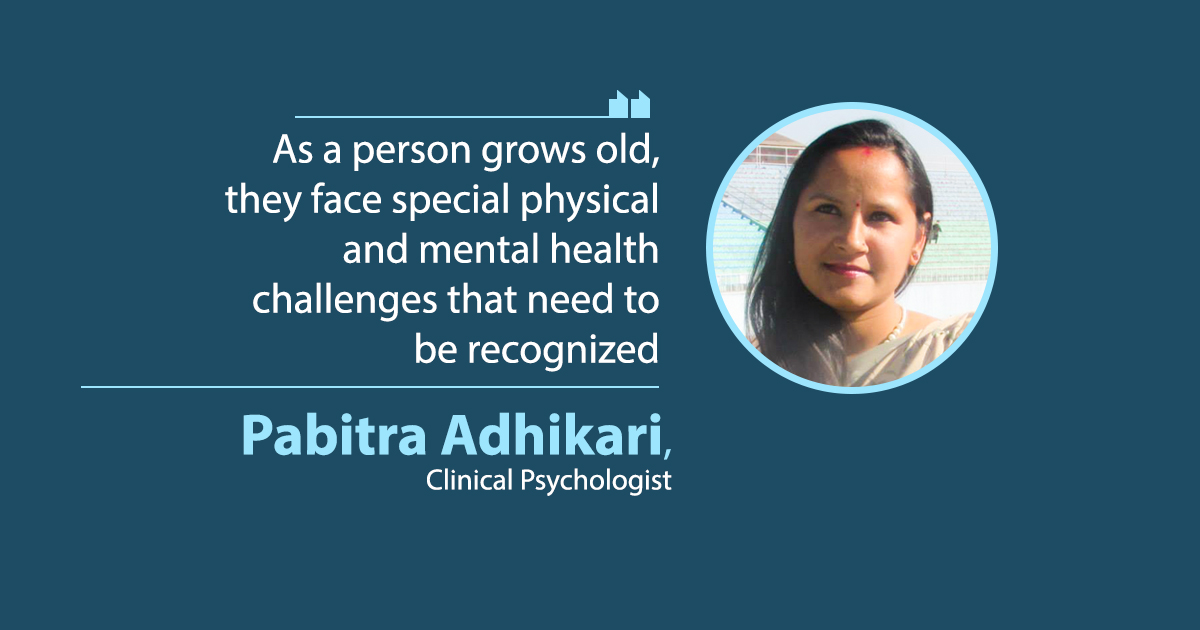The world population structure is changing and Nepal is no exception, where the birth rate is declining and life expectancy is increasing.
By 2050, the world’s population aged 60 years and older is estimated to be 22% of the total population, up from 12% in 2015. In absolute terms, this is an expected increase from 900 million to 2 billion people over the age of 60.
According to a recent household survey by the Central Bureau of Statistics (CBS) of Nepal, it is estimated that the total population of elderly is 9.1%, which is almost 3 million of the total population and it is increasing at the rate of 3.5%.
As a person grows old, they face special physical and mental health challenges that need to be recognized. Mental health includes emotional, psychological, and social well-being. It is important at every stage of life, from childhood and adolescence through old age.
In Nepal, there has been limited research on the prevalence of the mental disorder among the older population and most of the cases go unreported due to social stigma.
It affects how we think, feel, act and how we can handle stress, including making choices. According to World Health Organization (WHO), the most common mental and neurological disorders among the 60+ age group are dementia and depression that affect approximately 5% and 7% of the world’s older population, respectively.
Similarly, the prevalence of anxiety disorders, substance abuse, and self-harm among older people is 3.8%, 1% and around a quarter of deaths respectively. There was close to 800,000 suicide deaths worldwide in 2016.
It was found that elderly women and young adults have much higher suicide rates in middle and low- income counties.
In Nepal, there has been limited research on the prevalence of the mental disorder among the older population and most of the cases go unreported due to social stigma.
According to the research done by Nepal Health Research Council in 2019, over 38.7% of older people felt loneliness at a moderate level whereas, 16.9% of older people felt loneliness at a severe level and altogether 49.2% of the older population was found to be depressed.
Another study of 2018 suggests that the prevalence of depressive symptom cases ranged from 25.5% to 60.6% in the community, 17.3% to 89.1% in aged-care facilities and 53.2% to 57.1% in hospital settings.
Similarly, the prevalence of anxiety symptom cases ranged from 21.7% to 32.3%. These two studies conclude that older people experiencing mental health issues are quite noteworthy and emphasis should be given towards the implementation of a research approach to reveal this aspect of older people.
Awareness and understanding of common mental disorders are low in society. People with mental illness are often stigmatized. In most cases, the problem goes undiagnosed, and neither recognized nor treated appropriately.
Certain diseases that are more common to old age, such as Alzheimer’s disease, can also be the underlying cause of declining mental abilities.
It is worth checking with your doctor to make sure any cognitive changes, such as memory loss, aren’t associated with drugs or illness as the elderly in Nepal are found to have a higher number of mental health problems like loneliness, anxiety and depression.
The reason for this includes no post-retirement planning, dependency and physical weakness/illnesses.
Despite the increasing number of mental health problems of the elderly in Nepal, the subject is given less attention by the concerned authorities.
Awareness and understanding of common mental disorders are low in society. People with mental illness are often stigmatized. In most cases, the problem goes undiagnosed, and neither recognized nor treated appropriately.
Many people in our society hide their mental health issues while others follow traditional healers secretly. Another problem is related to facilities and human resources for mental health in Nepal.
We have only one mental hospital, 18 outpatient mental health facilities, 17 generals and teaching hospitals with inpatient mental unit which is only limited to central, zonal or district-level hospitals. Besides that, none of these facilities is specialized for mental health issues of older people.
Though we lack trained counselors and psychiatrists, we can still improve the mental health of the elderly by promoting ‘Active and Healthy Ageing’ for example: creating a suitable environment for their well-being and providing work opportunities for potential older people even after their retirement.
Moreover, research has shown that older adults prefer to spend time with their family and share their personal feelings. It helps them to escape from loneliness and other types of mental health problems.
Therefore, family members should be supportive and spend their time as much as possible. They can also, engage in memory-enhancing games like puzzles which improve short-term memory and thought processes.
Physical exercise and a healthy diet are other methods that reduce stress and symptoms of mental health conditions like depression and anxiety. Issues related to mental health can impact different people in different ways so it is necessary to identify symptoms early and seek help whenever possible.
(The writer is a clinical psychologist)
Views expressed in this article are the author’s own and do not necessarily reflect the stance of Khabarhub.









Comment